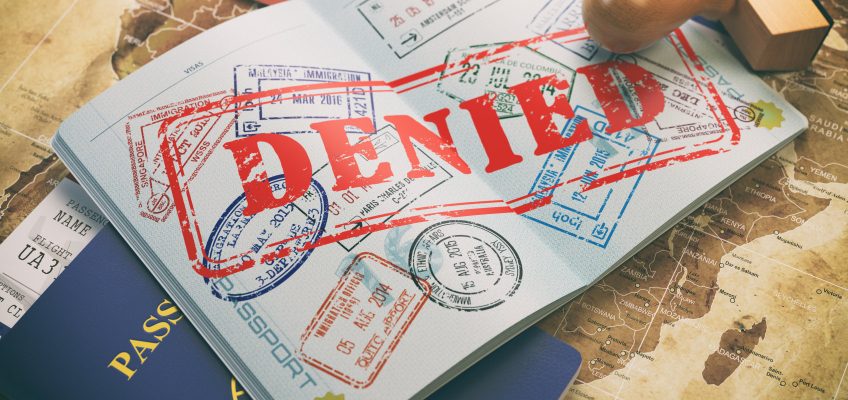For many people, being denied entry at the Immigration counter is one of their worst travel nightmares.
Have you ever thought about what happens if you are denied entry into a country?
Travellers can be denied entry into a country for many and varied reasons. Some of these are down to the traveller and sometimes, it is the airline’s fault. Reasons for being denied entry into a country include:
-
Having a criminal record
Whilst having a criminal record wont universally disentitle you from travelling, many countries have rules around travellers with criminal histories crossing their border. If you have a criminal history, you will need to check on the destination country’s rules and it may be you need to declare your history pre-travel and obtain authorisation to enter the country.
-
Not having a visa (or the right type of visa)
Sometimes travellers obtain the wrong visa type. Beware – this can see you blocked from entering the destination country. Some countries are very specific about the number of days a traveller on a certain visa type can remain in the country or what a visa entitles the traveller to do while in the country. If you are travelling on a 30 day tourist visa, don’t plan to stay even one day longer than that. Similarly if you are travelling for business, you will need a business visa, not a tourist visa. Flouting the rules on visa types can see you denied entry.
-
Not having an onward (or return) flight booking
Some countries are very particular about this. If you are visiting one of these countries, you must be able to show that you will only be in the country for a specific period of time. Travellers with no onward or return booking could deliberately or inadvertently overstay their visa and their movement around and out of the country can be difficult for authorities to track. Many Asian countries require you to prove that you WILL be leaving and WHEN!
-
Having overstayed or breached visa rules on a previous trip
If you think that staying a day or two longer wont matter, it might if you ever want to go back. Some countries take a dim view of travellers who breach the rules of their visa and overstaying is a typical example of this. For some countries, it is a lack of respect and if you’ve done it before, you’ll probably do it again. Take care in Asia, not only could you find yourself slapped with a fine when you try to re-enter, you may also be denied entry.
-
Having insufficient funds for the duration of your stay
No country wants to end up supporting a temporary visitor. Similarly, having a traveller take work whilst in the country at the expense of a resident is undesirable. So, you may be asked to show that you have sufficient funds for the period of your stay. If you don’t have money (or not enough), you could be denied entry.
Less common reasons for being denied entry include:
- Travellers who have an association (actual or suspected) with terrorist entities;
- Travellers suffering from serious and/or communicable diseases; and
- Travellers who are suspected of having malicious / criminal reason for travel.
So what happens if you are denied entry?
Being denied entry means you will be moved away from the Immigration counter and into an interview room. Here you will meet with immigration officials to discuss your situation and you will usually be given the opportunity to present a case for why you should be allowed to enter the country. If you are still denied entry, you will be given the reasons for this and the process of deportation will commence. It is important to always remain calm and pleasant when dealing with immigration officials – getting angry or abusive certainly wont help your cause.
If you are being deported, it is most likely you will be taken back to your departure point – that is where you boarded the plane to travel to the country where you have been denied entry.
Who pays if you are denied entry?
Usually the traveller pays the cost of being returned to the point of origin. Sometimes, (and if you are travelling on a return basis) the airline will allow you to use your return ticket and simply reticket you onto the next available flight. If not, the airline may change your return ticket for a fee or in some cases require you to purchase a new one-way flight. If you are travelling on a multi-sector basis, you will most likely be required to purchase a fare.
If you don’t have sufficient funds to purchase the fare, it will be suggested you obtain funding from family or friends. Failing that, you may be transported with the requirement that you settle the cost following your return home.
In some situations, you might have a case against the airline if they allowed you to travel without appropriate travel documentation. Airlines must comply with strict rules and can be fined if they allow travellers to travel without required documentation. If the airline knew that you were travelling to a country where having an onward (or return) ticket was a prerequisite and also knew that you did not have one, you could try and hold the airline accountable for costs incurred on the grounds of negligence in that they failed to advise you / prevent you from boarding at the departure point.
What about travel insurance?
As a general statement, travel insurance covers unforeseen losses. Travel insurers consider that it is the traveller’s responsibility to make sure they have appropriate travel documents and comply with the rules of the country they wish to enter. Most, if not all travel insurance policies exclude claims arising from errors or omissions in your booking arrangements, failure to obtain appropriate travel documents or prevention of access by the government of the country into which you wish to enter.
So, if you are denied entry and want to claim additional travel costs incurred due to this situation, your travel insurance policy wont cover this.
Entry into a country is not a right. No traveller has a guaranteed right of entry – this is at the discretion of the destination country border officials. It is important you are familiar with the rules of the country you wish to enter to make sure you comply. Even if you do, there always remains a chance that you will be prevented from crossing the border.
Got questions about visas and travel insurance? Why not call us on 1300 819 888 or send an email to info@goinsurance.com.au


